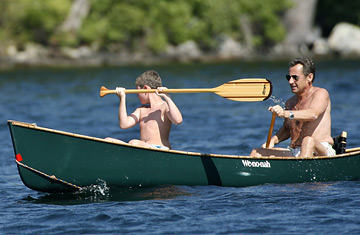
France's President Nicolas Sarkozy paddles a canoe with his son Louis on Lake Winnipesaukee while on vacation in Wolfeboro, N.H.
It may well have been the only area Nicolas Sarkozy was unable to deftly manage during his first 100 days as French president: the size of his love handles. Unflattering proof of that was supplied on Thursday — Sarkozy's 100th in the Elysée. The weekly magazine l'Express published the original of a photo rival Paris Match had run two weeks earlier, showing the shirtless Sarkozy canoeing with his son during their Wolfesboro, New Hampshire vacation. The Express shots, however, revealed the Paris Match pictures were retouched to eliminate unsightly flab hanging over the presidential shorts — a not entirely illogical (however shameless) pandering to Sarkozy's ego by a magazine whose former editor was fired after he ran a 2005 photograph of Cécilia Sarkozy with a man the magazine claimed was her lover.
The proud and athletic Sarkozy probably wasn't thrilled at the way his slight lateral protrusions invaded the media examination of his first, remarkably successful 100 days in office. However, he'd probably be wise to consider it a relatively harmless harbinger of more troubling events likely to await him during his second 100 days. Up until now, Sarkozy has impressed the French and world public with his relentless pace in attacking challenges both at home and abroad. He has smoothly guided through several contested legal and economic reforms in France; he's meanwhile staged diplomatic coups by brokering an agreement on European Union construction, engineering the freeing of seven Bulgarian medics held by Libya, and improved Franco-American by establishing a warm personal relationship with President George W. Bush. But despite that excellent start, coming months may be considerably more turbulent for both France and its president.
Sarkozy has long understood that to a French society perpetually concerned about unemployment, economic optimism is everything. And that is why Sarkozy has advanced his reform program this way: submit to a little pain now in exchange for far more gain from freer markets in the future. The problem is that to many French voters this pay-off seems to be getting more remote. Last week news came down that a mere 3,700 jobs were created between April and June — the lowest number since 2005. That shortfall sounded even grimmer against the government's announcement in July that 22,700 civil service jobs will be eliminated next year. The French then learned that second quarter 2007 economic growth was half of what had been expected, causing many economists to openly doubt that official growth forecasts of 2.25% for the year could be met. Then, as panicked world financial markets reacting to the U.S. real estate and credit meltdown sent worry throughout French society, France's highest legal body struck down a key aspect of a previously passed Sarkozy tax reform intended to benefit anyone paying off a home mortgage. To many looking on, there suddenly seemed to be far more pain than gain being dished out.
Much of that bad news, however, came in the back pages of French papers that mostly led with giddy, summertime fare about the Sarkozy family's American vacation, and the president's lunch meeting with Bush. But with both Sarkozy and France now returning to work from summer holiday, those economic realities will loom larger as the government attacks potentially explosive reform.
Unions are vowing to fight Sarkozy's promise to pass legislation setting minimal levels of service in public transport and schools during strikes. The very threat of that measure has led labor leaders to propose staging potentially crippling walk-outs in September and October, when hundreds of thousands of visitors are expected to converge on France as it hosts rugby's World Cup. Sarkozy must also figure out how to pass a viable budget for 2008 that takes into account nearly $15 billion in income tax cuts opponents say benefit the wealthy, and the limited revenues sluggish growth with produce. To compensate for those shortfalls, Sarkozy is considering introduction of a "social value added tax" on top of the nearly 20% VAT already in place. Opponents say that will not only shift the brunt of France's tax burden away from high income earners to consumers, but also sap spending set to plunge when prices on most foods are expected to spike this autumn due to grain shortages.
Polls also indicate French voters are aware the upcoming period will be less happy than during Sarkozy's first 100 days — and are adjusting their attitudes towards the president accordingly. After setting record highs for popularity during his 100 days, Sarkozy's approval ratings have now fallen five points in the space of a week. However, at 61%, Sarkozy's support remains comfortable — and largely derived from his public-pleasing reputation as an active and determined leader. Indeed, so many French voters say they had gotten so disgusted with the lack of movement and modernization under previous governments that they'd be willing to accept Sarkozy-led reform, even if they aren't initially happy about its content.
If so, pundits say, that could provide Sarkozy critical ballast to ride out union protests against controversial measures being prepared. Meanwhile, the media savvy Sarkozy knows from his first 100 days (not to mention his mega-hyped vacation) that the French public can't get enough coverage of its young, modern leader — a fascination he'll doubtless exploit to fully explain and sell reform he expects to provoke resistance. Should such exposure allow Sarkozy to push through reform that French governments have backed away from for over a decade, he'll doubtless consider any unflattering flab of his own exposed in that process as a price worth paying to move France into its own slimmed-down future.
